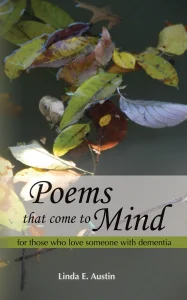April is National Poetry Month, a time when I like to tell people that poetry can be a kind of life writing. When my daughters were children, I wrote poems to document my feelings for them during their stages of growth from babies to high school graduates. Now they each have a pretty little book of hand-written poems about themselves to remember their young selves and me as their mother. My Poems That Come to Mind booklet holds very short poems, much of it haiku-type, that document my time caring for my mother and being among others with Alzheimer’s at a care home.
I see a lot of poetry out in social media, written freely for all to see. My area has a poetry center and poetry readings while the local colleges have classes on poetry writing. Maybe Amanda Gorman, the first National Youth Poet of the United States, inspired poetry writing, or at least poetry reading. I recently went to a well-attended writing presentation by Missouri’s current poet laureate, David Harrison. People do like to write poetry—are you one of them?
Most modern poetry does not rhyme, making it much easier to write. All you have to do is think about life and feel some rhythm and cadence in your wording. Make a booklet of poems about your life, or include your poems in your life writing stories or memoir. Maybe one of your poems would be a good introduction to your book, or as an ending.
In my mother’s Cherry Blossoms in Twilight memoir of growing up in Japan, she says her teacher took the class outside to nearby woods one day and told them poetry is to “find the feeling inside ourselves.”
Poetry as Memoir 2/4/2018
we sit side by side
holding hands in the soft sun
soon we fade away
dozing in warm nothingness
lost in the dove’s lamenting
– Poems That Come to Mind






